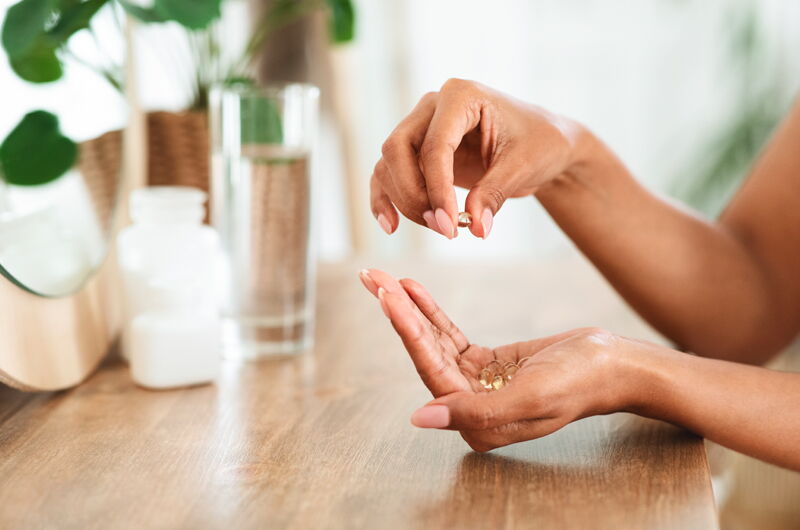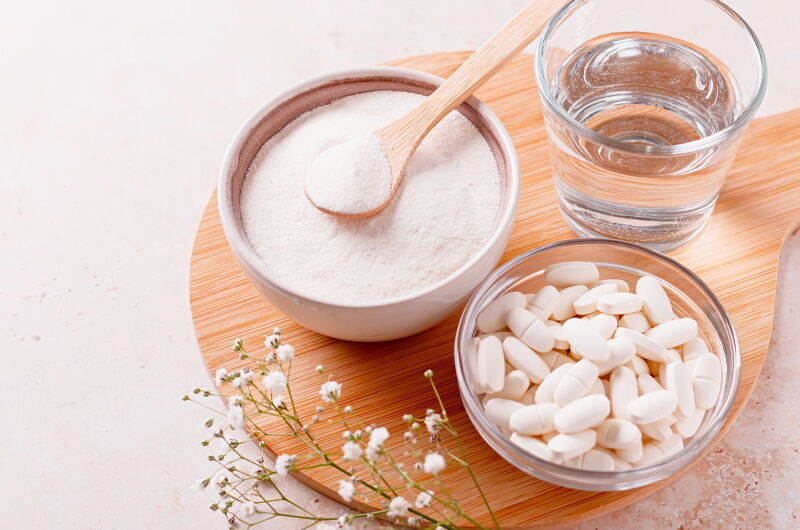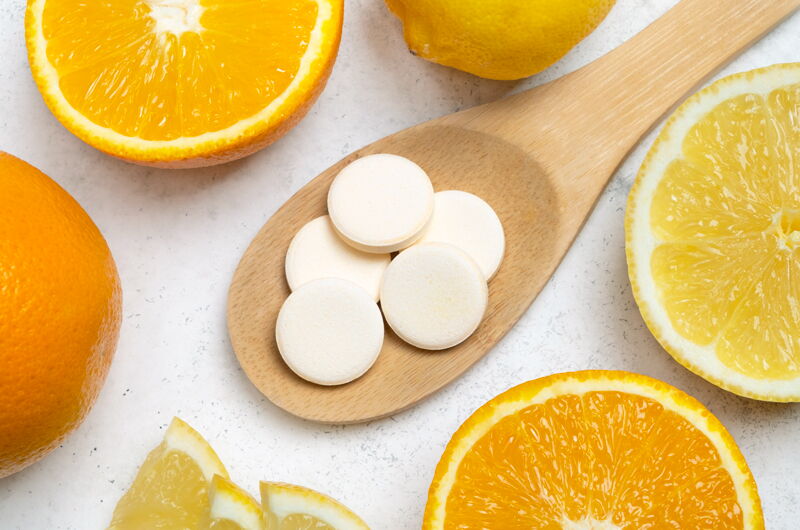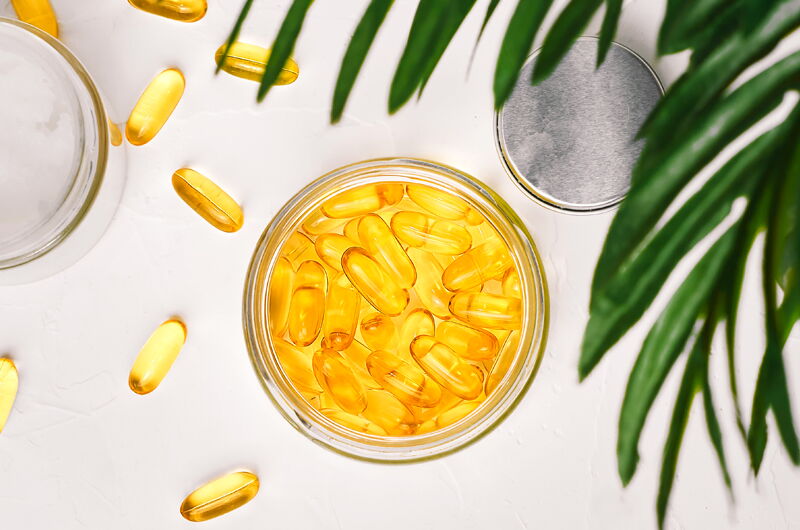Dry and poorly nourished skin can be caused by a number of factors, including dehydration, ageing, seasonal changes, allergies, and micronutrient deficiencies. Depending on the cause, different treatment methods can be used, including medicated ointments and moisturizers, to increase skin hydration. In addition, lifestyle changes, such as drinking more water and taking certain supplements, can improve skin dryness.
Today we will see just the best supplements that can make the difference to have "clean skin from within".
Vitamin D
Vitamin D is a fat-soluble vitamin that is essential for many aspects of health, including skin health. Keratinocytes are skin cells that make up most of the outer layer of the skin, known as the epidermis. Keratinocytes are the only cells in the body that can form vitamin D from its precursor 7-dehydroecholesterol (7-DHC) and transform it into a usable form by the body [1]. Vitamin D plays a key role in the function of the skin barrier and in the growth of skin cells, as well as maintaining the immune system of the skin, which acts as the first line of defence against harmful pathogens [1].
Research has shown that low blood levels of vitamin D are associated with skin conditions, including eczema and psoriasis, both of which may cause skin dryness [1]. In addition, vitamin D supplements have been shown to significantly improve the symptoms of skin disorders that cause dry and itchy skin, including eczema [2].
A large percentage of the population is deficient in vitamin D and, since this nutrient is essential for skin hydration, its supplementation can help combat dry skin [3].

Collagen
Collagen is the most abundant protein in our body and represents 75% of the dry weight of our skin [4]. There are several types of research that indicate the benefits of collagen integration for the skin.
A study of 69 women, who consumed 2.5-5 grams of collagen per day, showed improvements in elasticity and plasticity of the skin as well as hydration over 8 weeks [5].
The same thing was noted on longer studies (of 12 weeks) where, along with collagen, was also integrated Vitamin C (which we will arrive at in a moment) [6].

We then, very interestingly, a 2019 Review of 11 studies concluded that taking 2.5-10 grams of oral collagen supplements per day for 4-24 weeks increased skin hydration and treated xerosis [7].
Vitamin C
Vitamin C acts as a powerful protective antioxidant for the skin and is essential for the production of collagen, making it an important nutrient for skin health [8].
In fact, the skin contains very high levels of vitamin C, with some research that found a concentration of up to 64 mg of vitamin C per 100 grams of the epidermal layer. Not surprisingly, studies have shown that increased vitamin C in the diet, through vitamin C supplements, can improve many skin health factors, including skin hydration.
Some in-tube studies have found that vitamin C can improve the function of the skin barrier and help reduce water loss, which can help prevent dry skin [8].
In addition to this, studies have shown that when used in combination with other nutrients, vitamin C can help improve skin hydration.
For example, a 6-month study of 47 men showed that taking a supplement containing 54 mg of vitamin C, in addition to marine proteins and a combination of other nutrients, significantly improved skin hydration, compared to a placebo group [9].
Other studies in women have shown similar results.

A study of 152 women found that participants who took a supplement containing 54 mg of vitamin C, in addition to zinc and marine proteins, had significantly reduced skin roughness, compared to a placebo group [10].
Fish oils and Omega 3
Fish oil contains docosahexaenoic acid (DHA) and eicosapentaenoic acid (EPA), two essential fatty acids that have powerful anti-inflammatory and healing properties and have been shown to benefit the skin in many ways [11]. There is first and foremost an improvement in hydration, this was seen in a study on 90-day rats [12] The group that took fish oil had a 30% increase in skin hydration after 60 days of treatment.

There are other studies that test a daily treatment of fish oil from 1-14 grams of EPA and 0-9 grams of DHA for a period of 6 weeks up to 6 months [13]. There has been an improvement in psoriasis probably due to the strong anti-inflammatory effect demonstrated by Omega 3.
This can also be useful to reduce inflammation resulting from exposure to sunlight.
Conclusions
Proper hydration, as well as the most effective compounds and supplements to strengthen and heal the skin, are valuable allies for the well-being and health of the skin. Take care of the well-being and beauty of the skin at any age, you can do it!
References
[1] https://www.karger.com/Article/FullText/485132
[2] https://linkinghub.elsevier.com/retrieve/pii/S0899900716000770
[3] https://www.ncbi.nlm.nih.gov/books/NBK532266/
[4] https://www.ncbi.nlm.nih.gov/pubmed/30681787
[5] https://www.ncbi.nlm.nih.gov/pubmed/23949208
[6] https://www.ncbi.nlm.nih.gov/pmc/articles/PMC6835901/pdf/nutrients-11-02494.pdf
[7] https://www.ncbi.nlm.nih.gov/pubmed/30681787
[8] https://www.ncbi.nlm.nih.gov/pmc/articles/PMC5579659/
[9] https://www.ncbi.nlm.nih.gov/pubmed/26170708
[10] https://www.ncbi.nlm.nih.gov/pubmed/27462385
[11] https://www.ncbi.nlm.nih.gov/pubmed/30061538
[12] https://www.ncbi.nlm.nih.gov/pubmed/26195090
[13] https://www.ncbi.nlm.nih.gov/pmc/articles/PMC4134971/
